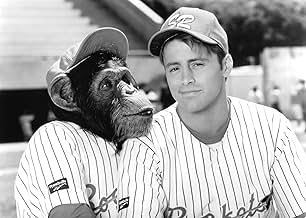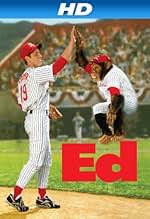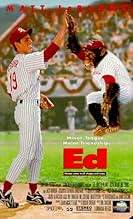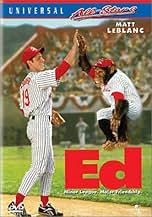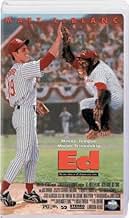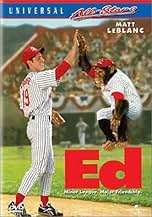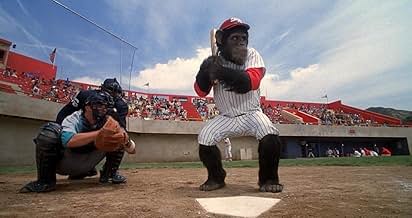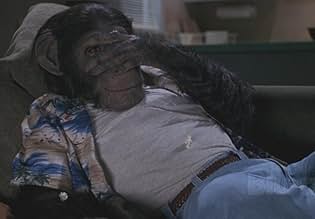A trained chimpanzee plays third base for a minor-league baseball team.A trained chimpanzee plays third base for a minor-league baseball team.A trained chimpanzee plays third base for a minor-league baseball team.
- Awards
- 4 nominations
- Director
- Writers
- All cast & crew
- Production, box office & more at IMDbPro
Storyline
Did you know
- Quotes
Jack 'Deuce' Cooper: I am going to spank that monkey!
Featured review
Despite persistent talk of Hollywood's "Golden Age of Cinema", movie-making did not truly reach its zenith until 1996. The movie was "Ed", not to be confused with the Whoopie Goldberg abortion of celluloid "Eddie", that premiered during that same year. In "Ed" award-winning documentary filmmaker Bill Couturie employs the technique of cinema verite that lets the camera capture a true slice of sporting Americana... a monkey playing minor league baseball.
"Ed" is not merely, as Brad Laidman of filmthreat.com raved, "[a movie] some would say that kids may like," but rather the examination of the symbiotic relationship between man and monkey. Despite their outward appearances, can a clear distinction really be made between the monkey Ed and his human counterpart, Matt LeBlanc? In the film, excel at baseball (although the monkey is the star), both delight in flatulence, and both have giant cartoon teeth. And wonderfully, when the film reaches it's glorious climax, it is the monkey that most clearly embodies our notions of humanity, imbibing LeBlanc with the confidence to again throw his curve-ball, the pitch that eventually paves his way into the Big Leagues (this is despite LeBlanc's supposed ability to throw a 125 mph fastball).
Although there may be some factual inaccuracies in the film (in a conversation with LeBlanc, a teammate tells him that Carlton Fisk was a flop in Boston, but went on to find greatness in Chicago), the true essence of "Ed" is in it's spirit... and in the fact that it has a monkey as it's star. Watching this film for the first time, I realized that I was examining the very embodiment of greatness. This being the case, "Ed" became the basis on which I would judge all future films. Forget Siskel and Ebert (especially Siskel) with their thumbs... forget Leonard Maltin with his stars... and forget A.O. Scott with his homosexual, liberal bias. The only scale worthy of film review is the Banana Scale.
Based on 3 bananas (because really, who needs five?) this scale cuts through all the other ridiculous criteria such as plot, character development, acting and direction commonly used by other critics in their evaluations, and judges movies based on three essential elements. These elements are:
1. Does the movie contain a character from "Friends"?
2. Does the movie contain a monkey?
3. Is the movie about baseball?
As you probably realize, there is only one film in history that contains all these elements, and, therefore, it is the greatest movie ever made. "Citizen Kane" by comparison, the film often mislabeled as the greatest, contains none of the essential elements of greatness. Therefore, it is hardly worth mentioning. But a movie such as "M.V.P.: Most Valuable Primate", centers it's story around a chimpanzee that plays for a youth hockey team. This is one of those interesting films that strives for greatness, but lacks certain characteristics that would've put it over the top. One may ask what director Robert Vince was thinking when he cast Rick Ducommun in the role of Coach Marlow when he could certainly have had David Schwimmer. And instead of hockey, why not youth baseball? But decisions such as these have presented film buffs with interesting fodder for years, wondering what could have been if, say, O.J. Simpson had in fact played the title role in "The Terminator", or if instead of Leonardo DiCaprio, director James Cameron had cast Dustin Diamond, as he originally planned? But judging on it's finished product, "MVP" receives 1 1/2 bananas... one for containing a monkey, and 1/2 for being about a sport other than baseball. Not bad, judging against the current, deplorable standards of Hollywood.
Based on it's greatness, it comes as a surprise to most that an "Ed" sequel has never been attempted. I have always assumed that the movie has become a victim of it's own greatness. Much like Roberto Clemente, who walked away during the apex of his career, knowing that he had reached a level of greatness that would doom his future endeavors to failure in the public eye by comparison, "Ed" director Bill Couturie knows that another installment would be severely overshadowed by it's predecessor. But taking matters into my own hands, I penned a letter to Mr. Couturie, outlining my ideas for a suitable sequel. The idea goes like this:
Both LeBlanc's character and Ed the monkey are playing in the major leagues... one for a team in the National league, the other for a team in the American. By coincidence, the two teams meet in the World Series. Although LeBlanc is now recognized as one of the greatest pitchers of all time, he is no match for the hitting prowess of Ed the monkey. And when they square of, mano-e-monkeyo, Ed the monkey is forced to make a decision whether to allow his friend LeBlanc to strike him out, or propel his team to victory by hitting a home-run, which he can do at will. I argue that this will be the first film that allows it's viewers to really get inside the mind of the monkey... to see his thought process, to witness what makes the monkey tick. By the time the last pitch is thrown, there won't be a dry eye in the house... and those tears will be both tears of laughter and tears of empathy... a rare combination.
Although I haven't heard back from Couturie as of yet, I expect a response before too long. Ideas like this don't come around everyday. If not Couturie, I imagine a Hollywood heavyweight director will jump on board.
From what I understand, Kubrick was considering optioning my treatment before his untimely passing. Although the idea was intriguing, I thought that perhaps Kubrick would understate the levity in a project such as this... opting for lingering shots, subtle dialog, and a brooding score by Beethoven, instead of the sped up action scenes, screaming monkey dialog, and circus music score that I believe the film "Ed II: Monkey in the Majors" calls for.
"Ed" is not merely, as Brad Laidman of filmthreat.com raved, "[a movie] some would say that kids may like," but rather the examination of the symbiotic relationship between man and monkey. Despite their outward appearances, can a clear distinction really be made between the monkey Ed and his human counterpart, Matt LeBlanc? In the film, excel at baseball (although the monkey is the star), both delight in flatulence, and both have giant cartoon teeth. And wonderfully, when the film reaches it's glorious climax, it is the monkey that most clearly embodies our notions of humanity, imbibing LeBlanc with the confidence to again throw his curve-ball, the pitch that eventually paves his way into the Big Leagues (this is despite LeBlanc's supposed ability to throw a 125 mph fastball).
Although there may be some factual inaccuracies in the film (in a conversation with LeBlanc, a teammate tells him that Carlton Fisk was a flop in Boston, but went on to find greatness in Chicago), the true essence of "Ed" is in it's spirit... and in the fact that it has a monkey as it's star. Watching this film for the first time, I realized that I was examining the very embodiment of greatness. This being the case, "Ed" became the basis on which I would judge all future films. Forget Siskel and Ebert (especially Siskel) with their thumbs... forget Leonard Maltin with his stars... and forget A.O. Scott with his homosexual, liberal bias. The only scale worthy of film review is the Banana Scale.
Based on 3 bananas (because really, who needs five?) this scale cuts through all the other ridiculous criteria such as plot, character development, acting and direction commonly used by other critics in their evaluations, and judges movies based on three essential elements. These elements are:
1. Does the movie contain a character from "Friends"?
2. Does the movie contain a monkey?
3. Is the movie about baseball?
As you probably realize, there is only one film in history that contains all these elements, and, therefore, it is the greatest movie ever made. "Citizen Kane" by comparison, the film often mislabeled as the greatest, contains none of the essential elements of greatness. Therefore, it is hardly worth mentioning. But a movie such as "M.V.P.: Most Valuable Primate", centers it's story around a chimpanzee that plays for a youth hockey team. This is one of those interesting films that strives for greatness, but lacks certain characteristics that would've put it over the top. One may ask what director Robert Vince was thinking when he cast Rick Ducommun in the role of Coach Marlow when he could certainly have had David Schwimmer. And instead of hockey, why not youth baseball? But decisions such as these have presented film buffs with interesting fodder for years, wondering what could have been if, say, O.J. Simpson had in fact played the title role in "The Terminator", or if instead of Leonardo DiCaprio, director James Cameron had cast Dustin Diamond, as he originally planned? But judging on it's finished product, "MVP" receives 1 1/2 bananas... one for containing a monkey, and 1/2 for being about a sport other than baseball. Not bad, judging against the current, deplorable standards of Hollywood.
Based on it's greatness, it comes as a surprise to most that an "Ed" sequel has never been attempted. I have always assumed that the movie has become a victim of it's own greatness. Much like Roberto Clemente, who walked away during the apex of his career, knowing that he had reached a level of greatness that would doom his future endeavors to failure in the public eye by comparison, "Ed" director Bill Couturie knows that another installment would be severely overshadowed by it's predecessor. But taking matters into my own hands, I penned a letter to Mr. Couturie, outlining my ideas for a suitable sequel. The idea goes like this:
Both LeBlanc's character and Ed the monkey are playing in the major leagues... one for a team in the National league, the other for a team in the American. By coincidence, the two teams meet in the World Series. Although LeBlanc is now recognized as one of the greatest pitchers of all time, he is no match for the hitting prowess of Ed the monkey. And when they square of, mano-e-monkeyo, Ed the monkey is forced to make a decision whether to allow his friend LeBlanc to strike him out, or propel his team to victory by hitting a home-run, which he can do at will. I argue that this will be the first film that allows it's viewers to really get inside the mind of the monkey... to see his thought process, to witness what makes the monkey tick. By the time the last pitch is thrown, there won't be a dry eye in the house... and those tears will be both tears of laughter and tears of empathy... a rare combination.
Although I haven't heard back from Couturie as of yet, I expect a response before too long. Ideas like this don't come around everyday. If not Couturie, I imagine a Hollywood heavyweight director will jump on board.
From what I understand, Kubrick was considering optioning my treatment before his untimely passing. Although the idea was intriguing, I thought that perhaps Kubrick would understate the levity in a project such as this... opting for lingering shots, subtle dialog, and a brooding score by Beethoven, instead of the sped up action scenes, screaming monkey dialog, and circus music score that I believe the film "Ed II: Monkey in the Majors" calls for.
- How long is Ed?Powered by Alexa
Details
Box office
- Budget
- $24,000,000 (estimated)
- Gross US & Canada
- $4,422,380
- Opening weekend US & Canada
- $1,910,840
- Mar 17, 1996
- Gross worldwide
- $4,422,380
- Runtime1 hour 34 minutes
- Color
- Sound mix
- Aspect ratio
- 1.85 : 1
Contribute to this page
Suggest an edit or add missing content


